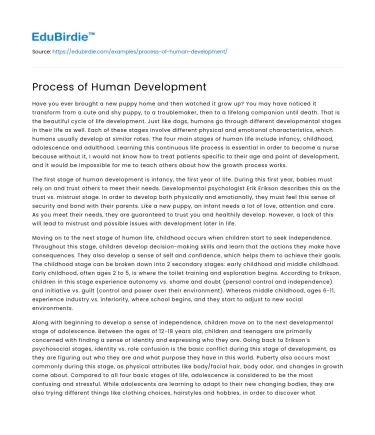Have you ever brought a new puppy home and then watched it grow up? You may have noticed it transform from a cute and shy puppy, to a troublemaker, then to a lifelong companion until death. That is the beautiful cycle of life development. Just like dogs, humans go through different developmental stages in their life as well. Each of these stages involve different physical and emotional characteristics, which humans usually develop at similar rates. The four main stages of human life include infancy, childhood, adolescence and adulthood. Learning this continuous life process is essential in order to become a nurse because without it, I would not know how to treat patients specific to their age and point of development, and it would be impossible for me to teach others about how the growth process works.
The first stage of human development is infancy, the first year of life. During this first year, babies must rely on and trust others to meet their needs. Developmental psychologist Erik Erikson describes this as the trust vs. mistrust stage. In order to develop both physically and emotionally, they must feel this sense of security and bond with their parents. Like a new puppy, an infant needs a lot of love, attention and care. As you meet their needs, they are guaranteed to trust you and healthily develop. However, a lack of this will lead to mistrust and possible issues with development later in life.
Save your time!
We can take care of your essay
- Proper editing and formatting
- Free revision, title page, and bibliography
- Flexible prices and money-back guarantee
Moving on to the next stage of human life, childhood occurs when children start to seek independence. Throughout this stage, children develop decision-making skills and learn that the actions they make have consequences. They also develop a sense of self and confidence, which helps them to achieve their goals. The childhood stage can be broken down into 2 secondary stages: early childhood and middle childhood. Early childhood, often ages 2 to 5, is where the toilet training and exploration begins. According to Erikson, children in this stage experience autonomy vs. shame and doubt (personal control and independence) and initiative vs. guilt (control and power over their environment). Whereas middle childhood, ages 6-11, experience industry vs. inferiority, where school begins, and they start to adjust to new social environments.
Along with beginning to develop a sense of independence, children move on to the next developmental stage of adolescence. Between the ages of 12-18 years old, children and teenagers are primarily concerned with finding a sense of identity and expressing who they are. Going back to Erikson’s psychosocial stages, identity vs. role confusion is the basic conflict during this stage of development, as they are figuring out who they are and what purpose they have in this world. Puberty also occurs most commonly during this stage, as physical attributes like body/facial hair, body odor, and changes in growth come about. Compared to all four basic stages of life, adolescence is considered to be the most confusing and stressful. While adolescents are learning to adapt to their new changing bodies, they are also trying different things like clothing choices, hairstyles and hobbies, in order to discover what they’re most comfortable with. In addition, you will notice a change in behavior from the young adolescent. The once sweet and innocent kid has now changed into a rebellious and sassy teenager, ready to make their independent mark on the world.
Finally, the last stage to complete the cycle of human life is adulthood, ages 19 to death. Throughout this stage, our physical bodies and emotional well-being continue to change, and we continue to learn and grow from experiences. Yet, there is more life challenges such as career, school and personal life, during this stage. Similar to childhood, this stage can also be broken down into three substages: early adulthood, middle adulthood and late adulthood. Deciding where you want to live, work and become romantically involved with are among the few emotional changes associated with early adulthood – ages 19 to 40. Intimacy vs. isolation is the main conflict of this stage due to the need of intimate and loving relationships for young adults. After finding love and building nurturing relationships, adults (40-65 years) then transition to middle adulthood and experience more physical changes than emotional through the generativity vs. stagnation stage. They have children and continue to work, while aging drastically through wrinkles, gray hair and slight weight gain. The ultimate stage of life – late adulthood, focuses on ego integrity vs. despair or their reflection on life. This is where you’ll find older adults feeling a sense of fulfillment and passing down their wisdom to their children and grandchildren. They usually live the rest of their days feeling grateful for the life they’ve lived until death.
In the end, learning about the stages of human life is a necessity for me as a nursing major in order to know how to treat and comfort each patient. Just like a new puppy, humans go through various developmental life stages and experience both physical and emotional changes. Though a predictable and similarly developed process among everyone, each patient develops in their own unique ways. Learning about this lifelong process helps me and other future nursing students to make generalizations about the different stages, comfortably treat patients and give information about how to react to each stage to patients, new and aging parents, older adults and more.






 Stuck on your essay?
Stuck on your essay?

